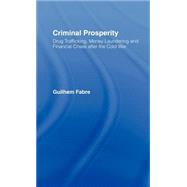Criminal Prosperity: Drug Trafficking, Money Laundering and Financial Crisis after the Cold War
, by Fabre,Guilhem- ISBN: 9780700714988 | 0700714987
- Cover: Hardcover
- Copyright: 12/30/2002
Drug trafficking is the most visible part of the profits of organized crime, which have grown considerably since the end of the cold war. The mirror of history shows us the impact of the drug trade in the colonization of Asia. The post cold war geopolitical context reproduces elements of the past, with new opportunities for drug trafficking in the globalization process, as can be seen in the example of China, and the lasting impunity in terms of money laundering. With the growing role of offshore locations in the global financial system, criminal prosperity has even affected the economic stability of some countries. This book presents a new and heterodox interpretation of the post cold war financial crisis, by focusing on the unexplored dimension of illicit actors. The Mexican crisis of 1994 and its 'tequila effect' is analyzed as a model of a 'cocaine effect' from the local laundering of profits from the sale of drugs in the US. The Japanese crisis of the 1990s is put in relation to the economic influenceof the Yakuza on the real estate bubble, which had the effect of postponing necessary market adjustments. And the Thai crisis of 1997 is analyzed in the light of massive money laundering of institutional and criminal networks, whose undeclared profits represent about 10% of GDP. These three case studies, which are confirmed in the conclusion by a short analysis of the Russian crisis of 1998, demonstrate how money laundering, with the complicity of some political parties eager to cover their electoral expenses, has distorted local financial intermediation by stimulating real estate and stock market bubbles. This new interpretation will be of interest to anyone concerned with international affairs, students of world politics and economics, and specialists on the third world.







